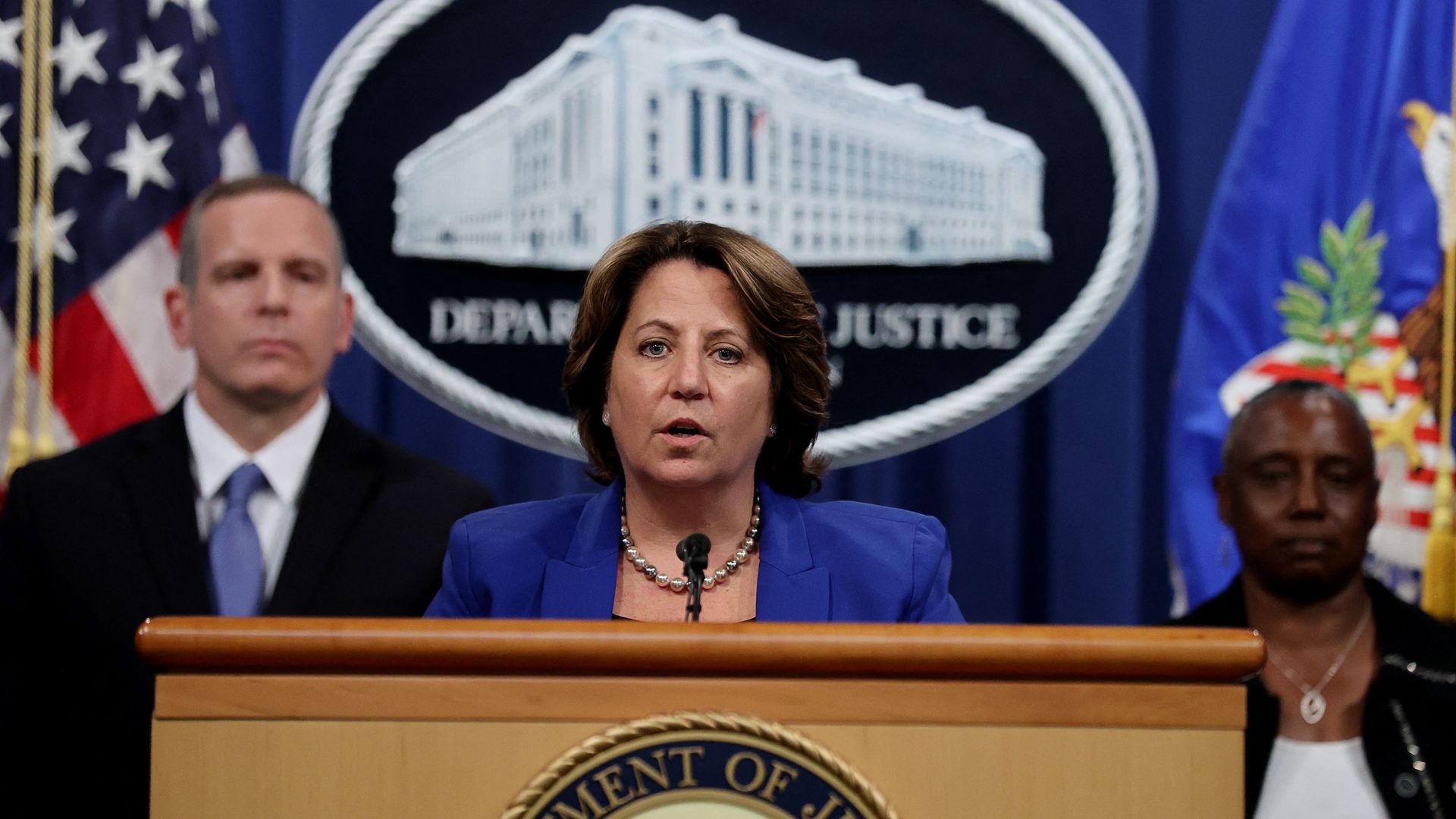| | | | | | | Presented By Facebook | | | | Axios Sneak Peek | | By Alayna Treene and Hans Nichols ·Jun 07, 2021 | | Welcome back to Sneak. The Justice Department announced that the cops beat the robbers. 🎧 Worthy of your time: Our Alayna Treene offers Dan Primack and Axios Re:Cap her insights about how Sens. Joe Manchin and Shelley Moore Capito have taken on outsize roles in determining the nation's political agenda, despite being from different parties and the small state of West Virginia. Smart Brevity™ count: 1,154 words ... 4.5 minutes. Edited by Glen Johnson. | | | | | | 1 big thing: Scoop — Illegal border crossings most in over decade — with four months to go |  | | | Migrants attempting to cross from Mexico are detained by U.S. Customs and Border Protection. Photo: Nick Ut/Getty Images | | | | The number of migrants illegally crossing the U.S.-Mexico border this fiscal year is already the most since 2006 — with four months left to go, according to preliminary Customs and Border Protection (CBP) data obtained by Axios' Stef Kight. Why it matters: The numbers quantify a lingering problem. Nearly 900,000 migrants were stopped by the Border Patrol from Oct. 1 to May 31. There also were more than 170,000 apprehensions last month — in line with 20-year records set in March and April. - In addition, there continue to be significant numbers of migrants from more distant nations such as Ecuador, Venezuela, Cuba and Haiti, the data show.
The big picture: The Biden administration has successfully managed to quickly release unaccompanied minors from Border Patrol stations after a backup forced thousands to wait for days earlier in the year. - It also has managed to slowly decrease the total number of kids being held in shelters run by the Department of Health and Human Services.
- Still, despite these efforts and the continued use of a Trump-era public health order to quickly turn back families and adults to Mexico, migrants continue to flock to the border.
By the numbers: The majority of border-crossers continue to come from Mexico (more than 40%) and the Northern Triangle countries of Guatemala, Honduras and El Salvador. - That said, some Border Patrol sectors in the southwest United States are seeing far more people from other, more distant nations.
- In just five sectors, more than 32,000 Ecuadorians have been encountered at the U.S.-Mexico border this fiscal year. About 13,000 Brazilians have been stopped in the Yuma, Arizona, sector alone, on top of about 7,000 in two other sectors, according to the data.
- There were fewer than 40,000 migrants not from Mexico, Guatemala, Honduras or El Salvador encountered by border officials for the entire fiscal year of 2018.
What to watch: Vice President Kamala Harris was in Guatemala today before traveling to Mexico for meetings tomorrow as she leads the administration's effort to address the root causes of this migration. - They include crime, government corruption and lackluster responses to natural disasters and the coronavirus pandemic throughout the Northern Triangle.
Keep reading. |     | | | | | | 2. Pro-McConnell PAC to vet Trump's 2022 primary picks |  | | | Photo illustration: Sarah Grillo/Axios. Photo: Doug Mills-Pool/Getty Images | | | | A super PAC closely aligned with Senate Minority Leader Mitch McConnell (R-Ky.) is prepared to intervene in GOP primaries — and challenge former President Trump — as it looks for the most viable candidates to reclaim the Senate, Axios' Hans Nichols reports. Driving the news: Trump's weekend endorsement of Rep. Ted Budd (R-N.C.) in his state's 2022 Senate race put the GOP establishment on notice that party leaders won't necessarily get to handpick their preferred candidates for the crucial midterms. - In some cases, Trump and GOP strategists may agree on who the best candidate is, but the pro-McConnell PAC — the Senate Leadership Fund — also is making clear it will make its own, independent assessment.
- "As has long been SLF's policy, we reserve the right to intervene in cases where a candidate is a clear threat to lose a seat in a general election and to protect our Republican incumbents," Jack Pandol, the PAC's communications director, told Axios.
Why it matters: Candidate selection will be crucial to Republican efforts next year, given the 50-50 split in the Senate and GOP retirements in North Carolina, Pennsylvania, Ohio, Missouri and Alabama. - The National Republican Senatorial Committee, led by Sen. Rick Scott (R-Fla.), has indicated it won't intervene in open primaries and focus instead on softening up the likely Democratic nominee.
- "The NRSC has no interest spending any time or money attacking other Republicans," said Chris Hartline, the NRSC's communications director. "We started Day 1 defining Democrats across the country as the ultra-liberal, big-spending, open borders radicals that they are."
Flashback: The NRSC did take an interventionist approach in Kansas in 2020 and helped guide their preferred candidate, now-Sen. Roger Marshall, through a winding primary. - The Democratic Senatorial Campaign Committee also has long taken an interventionist approach and refuses to apologize for trying to clear the field in favor of its favored candidates.
Between the lines: Scott has asked the former president to stay neutral in primaries. - Trump's North Carolina endorsement, as well as his attacks on Arizona Attorney General Mark Brnovich, who is contemplating his own Senate run, suggest Trump has other plans.
- In Missouri, the GOP establishment is concerned that former Gov. Eric Greitens, who resigned from office in 2018 after being indicted, could get a nod from Trump.
Keep reading. |     | | | | | | 3. By the numbers: Vice presidential travel destinations |  Data: Axios research; Map: Danielle Alberti/Axios Guatemala was the first destination on Harris' maiden foreign trip as vice president, a job often derided for its heavy attendance at funerals but, increasingly, an added international tool for a president, Stef also writes. Throwback: Mike Pence took his first international trip as VP to Germany, followed by a stop in Belgium for NATO and European Union meetings. - Both Pence and President Biden, when he served as vice president, spoke at the Munich Security Conference during their first foreign trips.
- Harris spent today in meetings with Guatemalan officials and addressing reporters during a news conference.
|     | | | | | | A message from Facebook | | The internet has changed a lot since 1996 - internet regulations should too | | |  | | | | It's been 25 years since comprehensive internet regulations passed. See why we support updated regulations on key issues, including: - Protecting people's privacy.
- Enabling safe and easy data portability between platforms.
- Preventing election interference.
- Reforming Section 230.
| | | | | | 4. Republican wins in Hispanic Democratic stronghold |  | | | Javier Villalobos after his win. Photo: Courtesy of Villalobos campaign | | | | A Republican has won a mayoral race in a South Texas Hispanic Democratic bastion, sparking celebration from the GOP nationwide and alarm from some Democrats, Axios' Russell Contreras reports. Why it matters: Javier Villalobos' victory Saturday in Mexican American-majority McAllen, Texas, comes as some Latino Democrats say their party has been ignoring Mexican Americans in Texas, New Mexico and California as the Republican Party makes dents in areas once solidly blue. Driving the news: Villalobos, an attorney and former chair of the Hidalgo County GOP, beat Veronica Whitacre by about 200 votes in a nonpartisan race where Democrats have dominated for years. - His victory drew praise from former Trump 2020 campaign adviser Steve Cortes, who tweeted, "Amazing news! McAllen, Texas, is a major border town of 140,000 people. 85% Hispanic — and just elected a Republican mayor."
- Texas Gov. Greg Abbott, a Republican, joined conservatives on social media to congratulate Villalobos and say Hispanic voters are opening up to populist, Republican messages.
The bilingual Villalobos ran on improving the economy in a border town where nearly a fourth of residents live in poverty but is one of the safest communities in the nation, FBI crime statistics show. - "South Texas is very conservative and Hispanics here have always voted Democratic because of our parents and grandparents out of tradition," Villalobos told Russell, who co-authors the Axios Latino newsletter with Marina E. Franco of Noticias Telemundo.
- "Hopefully, they are opening up their eyes. Competition is good."
Between the lines: Former president Trump made gains with Hispanics in South Texas by shifting from rhetoric about immigration to fears surrounding the economic impact of COVID-19 shutdowns, according to preliminary findings by research firm Equis that were reviewed by Axios. - The same analysis found that Republicans and conservative groups made inroads via YouTube in 2020 with low-information Latino voters often ignored by Democrats.
What they're saying: New Mexico Democratic political consultant Sisto Abeyta said Democrats in recent years have not engaged or invested in some Hispanic areas with low voter turnout that historically have voted blue. - "Democrats need to change the narrative and start talking about jobs," Abeyta said. "They need to invest and engage and not take these districts for granted. These voters are up from grabs now."
Keep reading. |     | | | | | | 5. Pic du jour |  | | | Photo: Jonathan Ernst/Pool/AFP via Getty Images | | | | Deputy Attorney General Lisa Monaco announced the recovery of millions of dollars worth of cryptocurrency from hackers who conducted the Colonial Pipeline Co. ransomware attack. |     | | | | | | A message from Facebook | | Why Facebook supports updated internet regulations | | |  | | | | 2021 is the 25th anniversary of the Telecommunications Act of 1996, the last major update to internet regulation. It's time for an update to set clear rules for addressing today's toughest challenges. See how we're taking action on key issues and why we support updated internet regulations. | | | | 👏 Thanks for reading. You can get email delivery of this and all of Axios' other free newsletters through this link. Please pass it on! |  | | The tool and templates you need for more engaging team updates. | | | | | | Axios thanks our partners for supporting our newsletters. If you're interested in advertising, learn more here.
Sponsorship has no influence on editorial content. Axios, 3100 Clarendon Blvd, Suite 1300, Arlington VA 22201 | | | You received this email because you signed up for newsletters from Axios.
Change your preferences or unsubscribe here. | | | Was this email forwarded to you?
Sign up now to get Axios in your inbox. | | | | Follow Axios on social media:    | | | | | |









No comments:
Post a Comment